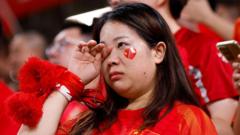In a devastating display, China’s football team faced their lowest point on a humid Thursday night in Saitama, succumbing to Japan with a staggering 7-0 scoreline. This defeat not only marked the worst performance in a World Cup qualifier for China but effectively highlighted the myriad challenges plaguing the nation's football scene. A mere minute remained when Japan's Takefusa Kubo delivered the final blow, sealing China’s fate on the pitch.
This shocking defeat was preceded by a series of unsatisfactory performances, falling victim to losses against teams like Oman, Uzbekistan, and Hong Kong. In an alarming twist, just a week later, a crackdown on corruption ensnared dozens of players, coaches, and officials as Chinese football grapples with systemic misconduct, impacting the sport at all levels.
Once buoyed by ambitious hopes, China envisioned transforming into a football powerhouse under President Xi Jinping's leadership. His aspirations, which included qualifying for and eventually hosting the World Cup, have seemingly withered as the men's team now languishes at a dismal 90th place in FIFA rankings, trailing teams like Curaçao and Luxembourg.
Sports analysts point to a fundamental flaw in how football is managed in China. With political appointments running rampant in the Chinese Football Association (CFA) and decisions flowing top-down, accountability and expertise remain lacking. Experts argue that grassroots development, essential for nurturing football talent, is nearly non-existent. According to Mark Dreyer, a sports writer in Beijing, the lack of a footballing pyramid—where amateur leagues support professional tiers—leads to a shallow talent pool.
Despite football’s struggles, the country’s women’s team, currently ranked 17th in the world, continues to inspire pride among fans, contrasting sharply with the men’s dismal performance. However, overall, football faces steep competition from other sports. Due to greater governmental support, China excels in sports like swimming and weightlifting that require less community engagement compared to football.
The country’s football leagues are presently in turmoil, with over 40 clubs folding since the economic downturn following the pandemic. Prominent teams like Jiangsu FC and Guangzhou Evergrande, previously champions, have been decimated by financial struggles linked to corporate overstretching in the property market.
While the depth of love for football in China endures, frustration during international matches continues to grow. After the crushing defeat to Japan, sentiments were apparent on social media, directing humorous quips and sarcastic criticisms at the national team's consistency in disappointing performances.
Experts and fans alike recognize that genuine improvement in Chinese football hinges on long-term planning unfettered by political agendas. A notable sports journalist emphasized that football's enhancement cannot be achieved through mere rhetoric or governance—what is needed is technical proficiency fostered through consistent and focused training.
As Chinese football grapples with an uncertain future amid corruption and disappointing performances, the disillusionment amongst its supporters grows, echoing a need for genuine restructuring and revitalization of the sport at a foundational level.






















